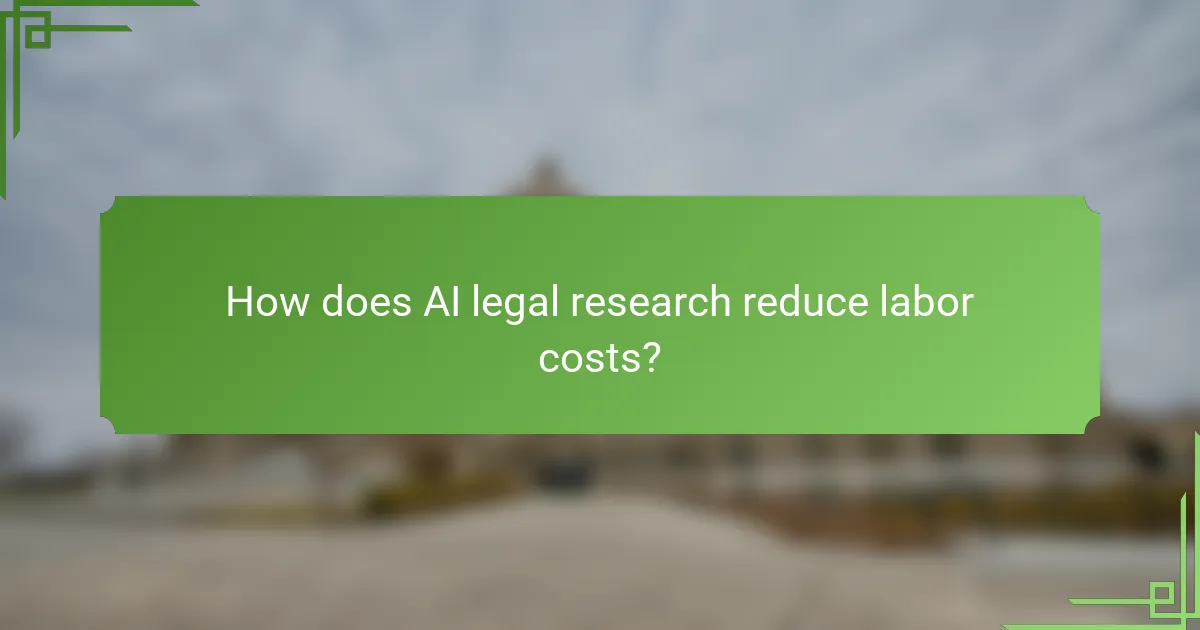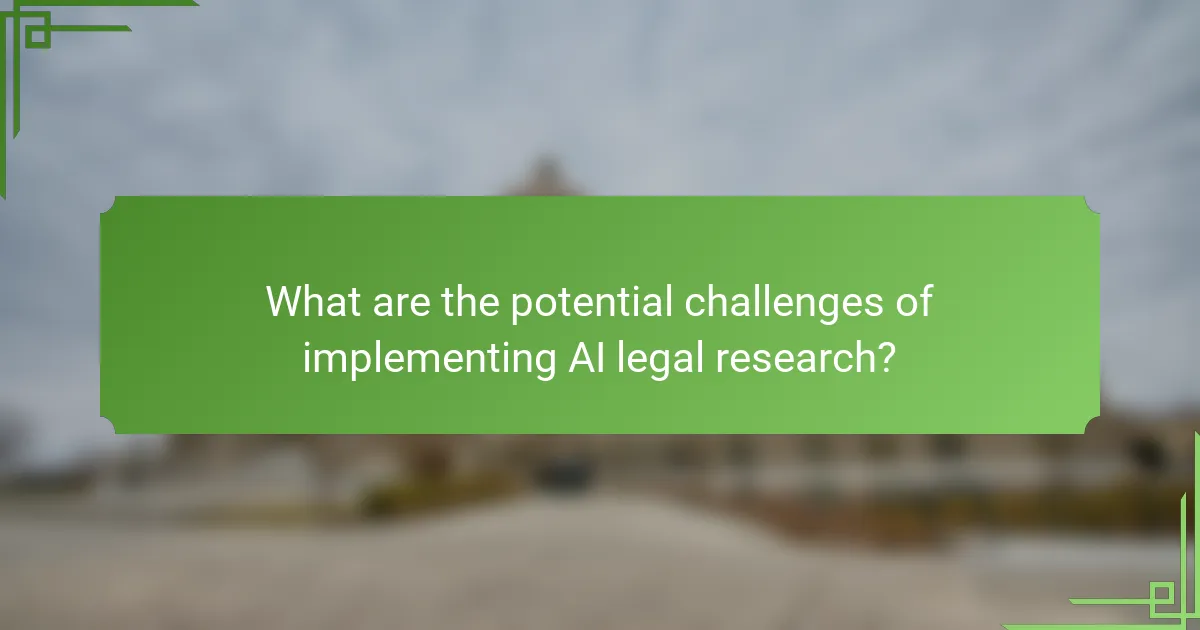
How does AI legal research reduce labor costs?
AI legal research reduces labor costs by automating time-consuming tasks. Automation allows for faster data retrieval and analysis. Traditional legal research can take hours or days. AI can complete these tasks in minutes. This efficiency leads to reduced billable hours for clients. Firms can allocate resources to more complex tasks. Studies show AI tools can decrease research time by up to 80%. This results in significant cost savings for law firms and clients alike.
What are the key features of AI legal research tools?
AI legal research tools feature advanced algorithms for efficient case law analysis. They utilize natural language processing to understand legal queries better. These tools provide comprehensive databases that include statutes, regulations, and case law. They often include citation analysis to track legal precedents effectively. Many tools offer predictive analytics to forecast case outcomes based on historical data. User-friendly interfaces allow legal professionals to navigate information quickly. Collaboration features enable teams to share insights and findings easily. These tools significantly reduce research time, leading to cost savings in legal practices.
How do these features streamline legal research processes?
AI legal research features streamline legal research processes by automating repetitive tasks. Automation reduces the time spent on manual searches. It enhances accuracy by minimizing human error. AI tools can quickly analyze vast databases of legal texts. This allows for faster retrieval of relevant case law and statutes. Natural language processing enables intuitive search queries. Users can input questions in plain language and receive precise answers. These features lead to more efficient use of legal resources. Studies show that firms using AI legal research save significant hours in research time.
What technologies underpin AI legal research?
AI legal research is underpinned by several key technologies. Natural Language Processing (NLP) allows systems to understand and interpret legal language. Machine Learning (ML) algorithms enable AI to learn from vast legal datasets and improve accuracy over time. Data mining techniques extract relevant information from unstructured legal documents. Knowledge graphs organize legal concepts and relationships for better retrieval. Cloud computing provides scalable resources for processing large volumes of legal data. These technologies collectively enhance the efficiency and effectiveness of legal research tasks.
Why is reducing labor costs important in the legal industry?
Reducing labor costs is important in the legal industry to enhance profitability and competitiveness. Legal firms often face high operational expenses. Labor costs constitute a significant portion of these expenses. By reducing these costs, firms can allocate resources more effectively. This can lead to improved financial health and sustainability. Moreover, lower labor costs can allow firms to offer more competitive pricing. This attracts a wider range of clients. The adoption of technologies like AI in legal research has proven effective in minimizing labor costs. Studies show that AI can reduce research time by up to 80%. Therefore, embracing automation is crucial for maintaining a competitive edge in the market.
How do high labor costs impact law firms’ profitability?
High labor costs significantly reduce law firms’ profitability. Increased salaries and benefits lead to higher operational expenses. These costs can consume a large portion of a firm’s revenue. When labor costs rise, firms may struggle to maintain competitive pricing. This can result in losing clients to firms with lower overhead. Additionally, high labor costs limit funds available for investment in technology and innovation. A study by the American Bar Association found that firms with lower labor costs reported higher profit margins. Therefore, managing labor costs is crucial for maintaining profitability in law firms.
What are the traditional labor costs associated with legal research?
Traditional labor costs associated with legal research typically include attorney billing rates, paralegal salaries, and research assistant fees. Attorney billing rates can range from $150 to over $1,000 per hour, depending on experience and location. Paralegals often earn between $50,000 and $80,000 annually, translating to approximately $25 to $40 per hour. Research assistants may charge $20 to $50 per hour. These costs accumulate quickly, especially for complex cases requiring extensive research. According to the National Association for Law Placement, the average law firm spends around $15,000 annually per attorney on legal research. This data highlights the significant financial burden traditional legal research imposes on law firms.

What automation benefits does AI legal research provide?
AI legal research provides significant automation benefits that enhance efficiency and accuracy. It streamlines the legal research process by quickly analyzing vast amounts of data. Traditional legal research can take hours or days, whereas AI can deliver results in minutes. This speed reduces labor costs associated with time-intensive research tasks.
Additionally, AI legal research minimizes human error by providing precise and relevant case law and statutes. It uses natural language processing to understand queries and deliver accurate results. A study by McKinsey found that AI can automate up to 23% of a lawyer’s workload, demonstrating its potential to transform legal practices.
By integrating AI, law firms can reallocate resources to more strategic tasks, further optimizing operational efficiency. These automation benefits ultimately lead to improved client service and increased competitiveness in the legal market.
How does AI improve the efficiency of legal research?
AI improves the efficiency of legal research by automating information retrieval and analysis. It can quickly sift through vast databases of case law, statutes, and legal documents. Traditional research methods can take hours or days. AI tools can deliver relevant results in minutes. This speed allows legal professionals to focus on strategy and client interaction. AI also reduces human error in legal research. Studies show that AI can enhance accuracy by identifying relevant precedents more effectively. According to a 2020 report by McKinsey, AI tools can increase research efficiency by up to 30%. This efficiency leads to reduced labor costs and improved service delivery in legal practices.
What specific tasks can AI automate in legal research?
AI can automate several specific tasks in legal research. These tasks include document review, case law analysis, and legal citation checks. AI systems can quickly analyze large volumes of legal documents. They identify relevant precedents and summarize key points. Furthermore, AI tools can assist in predicting case outcomes based on historical data. They can also streamline the process of legal research by providing insights from vast databases. Research shows that AI can reduce the time spent on these tasks by up to 70%. This efficiency leads to significant labor cost reductions for legal firms.
How does automation affect the accuracy of legal research outcomes?
Automation improves the accuracy of legal research outcomes by reducing human error. Automated systems can process vast amounts of legal data quickly and consistently. This leads to more comprehensive searches and retrieval of relevant case law. Studies show that AI legal research tools can identify pertinent documents with higher precision than manual methods. For instance, a 2021 study by the Stanford Law School found that AI tools improved search accuracy by up to 40%. Additionally, automation allows for real-time updates, ensuring that researchers access the most current legal information. Overall, automation enhances the reliability of legal research results.
What are the implications of AI on legal staffing?
AI significantly impacts legal staffing by automating routine tasks and enhancing efficiency. Legal professionals can delegate repetitive activities to AI tools. This shift allows lawyers to focus on complex legal issues requiring human judgment. Consequently, firms may reduce staff numbers or reallocate roles towards more strategic functions. According to a report by McKinsey, automation can lead to a 23% reduction in legal labor costs. Additionally, AI enhances the accuracy of legal research, which can improve case outcomes. As a result, firms adopting AI technologies may gain a competitive edge in legal services.
How might AI change the roles of legal professionals?
AI will significantly change the roles of legal professionals by automating routine tasks. Legal professionals will spend less time on document review and research. AI tools can analyze large volumes of legal documents quickly. This efficiency allows lawyers to focus on more complex legal issues. Additionally, AI can assist in predicting case outcomes based on historical data. This predictive capability enhances decision-making for legal strategies. As a result, the demand for paralegals and junior associates may decline. Legal professionals will need to adapt by developing skills in AI technology and data analysis.
What skills will be in demand as AI transforms legal research?
Skills in data analysis, legal technology proficiency, and critical thinking will be in demand as AI transforms legal research. Data analysis skills will enable legal professionals to interpret large datasets effectively. Proficiency in legal technology will be crucial for navigating AI tools and platforms. Critical thinking skills will help in assessing AI-generated results for accuracy and relevance. Additionally, understanding AI ethics and compliance will become increasingly important. Collaboration skills will also be essential as legal teams integrate AI into their workflows. These skills align with the evolving landscape of legal research influenced by AI advancements.

What are the potential challenges of implementing AI legal research?
The potential challenges of implementing AI legal research include data quality, integration issues, and ethical concerns. Data quality is crucial because AI systems rely on accurate and comprehensive legal databases. Incomplete or biased data can lead to incorrect conclusions. Integration issues arise when AI tools do not seamlessly fit into existing legal workflows. This can disrupt productivity and create resistance among staff. Ethical concerns include the risk of over-reliance on AI, which may compromise legal judgment. Additionally, there are worries about data privacy and confidentiality in handling sensitive legal information. These challenges must be addressed to ensure successful implementation of AI legal research.
What concerns exist regarding the reliability of AI legal research?
Concerns regarding the reliability of AI legal research include accuracy, bias, and interpretability. AI systems may misinterpret legal language or context, leading to incorrect conclusions. Studies indicate that AI tools can produce biased results if trained on flawed data. Additionally, the lack of transparency in AI algorithms raises questions about how decisions are made. Legal professionals may struggle to understand AI-generated outputs, impacting trust in the technology. These factors can undermine the effectiveness of AI in legal research.
How can law firms address the limitations of AI tools?
Law firms can address the limitations of AI tools by integrating human oversight into the AI processes. This ensures accuracy and contextual understanding that AI alone may lack. Training staff to effectively use AI tools enhances their capabilities. Regularly updating AI systems with the latest legal information improves their relevance. Collaborative approaches between AI and legal professionals can lead to better outcomes. Implementing feedback mechanisms allows continuous improvement of AI tools. According to a study by the American Bar Association, 76% of attorneys believe that human judgment remains essential in legal practice despite advancements in AI.
What ethical considerations arise from using AI in legal research?
Ethical considerations in using AI for legal research include issues of bias, accountability, and confidentiality. AI systems may inherit biases from training data, leading to unfair outcomes in legal decisions. Accountability becomes complex as it is unclear who is responsible for errors made by AI. Confidentiality is also at risk if sensitive legal information is mishandled by AI systems. A study by the American Bar Association highlights these concerns, emphasizing the need for ethical guidelines in AI deployment within legal contexts.
What best practices can law firms adopt for successful AI integration?
Law firms can adopt several best practices for successful AI integration. First, they should identify specific use cases for AI that align with their operational goals. Common applications include document review, legal research, and contract analysis. Next, firms should invest in training staff to understand AI tools and their benefits. This ensures that employees are equipped to utilize AI effectively. Additionally, firms must prioritize data quality and security. High-quality data enhances AI performance, while robust security protects sensitive client information. Collaboration with AI vendors is also crucial. Establishing strong partnerships can facilitate smoother integration and ongoing support. Regular evaluation of AI systems is necessary to adapt to evolving needs and technologies. Continuous feedback from users helps in optimizing AI tools for better performance. Lastly, law firms should foster a culture of innovation. Encouraging experimentation with AI can lead to discovering new efficiencies and capabilities.
How should firms train staff to work with AI legal research tools?
Firms should train staff to work with AI legal research tools through structured programs. These programs should include hands-on workshops to familiarize employees with the software. Training should cover the specific functionalities of the tools being used. Employees need to understand how to input queries effectively. They should learn to interpret and analyze AI-generated results. Regular refresher courses can help maintain proficiency. Firms should also encourage a culture of continuous learning. This approach ensures staff stay updated on advancements in AI legal research technology.
What strategies can be employed to measure the effectiveness of AI in legal research?
To measure the effectiveness of AI in legal research, implement quantitative and qualitative metrics. Quantitative metrics include time saved in research tasks and accuracy rates of AI-generated results. For example, a study by the American Bar Association found that AI tools reduced research time by up to 50%. Qualitative metrics involve user satisfaction surveys and feedback from legal professionals. Gathering insights on usability and relevance of AI outputs can provide valuable context. Additionally, comparing AI performance against traditional research methods can highlight efficiency gains. Tracking case outcomes influenced by AI-assisted research may also demonstrate its impact on legal effectiveness.
AI legal research is a transformative entity that significantly reduces labor costs in the legal industry through automation. By streamlining time-consuming tasks such as data retrieval and analysis, AI tools can decrease research time by up to 80%, allowing law firms to allocate resources more effectively. Key features of these tools include advanced algorithms, natural language processing, and predictive analytics, which enhance efficiency and accuracy in legal research. Additionally, the integration of AI impacts staffing by automating routine tasks, necessitating new skills in data analysis and technology among legal professionals. The article also addresses potential challenges, ethical considerations, and best practices for successful AI implementation in legal research.